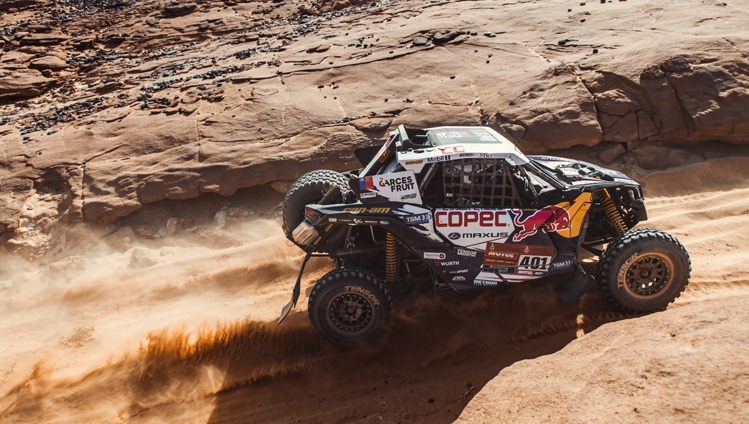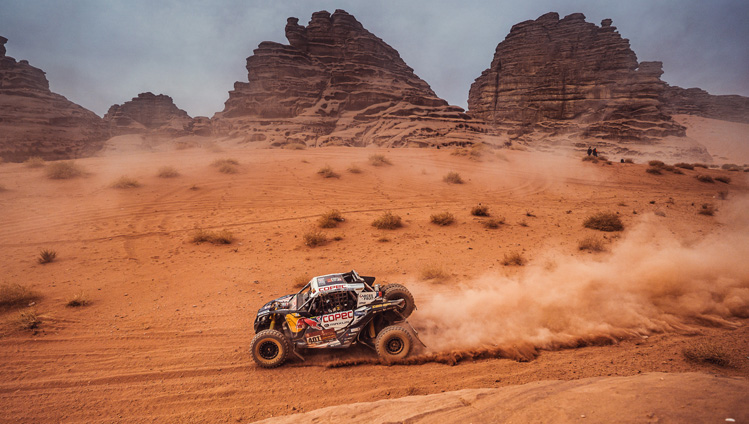Daring adventure and action with lots of horsepower? Automobile racing delivers excitement and sensation beyond the tarred roads: In wild off-road races. Jumping, hauling, landing - for the demanding rides through stony terrain and hot sand, the vehicles must meet the highest requirements. A pioneer in this field: BRP Can-Am.
BRP, a Canadian manufacturer of snowmobiles, all-terrain vehicles, motorcycles, and personal watercraft has a top-class vehicle on the slopes with its Can-Am Maverick X3: 195 turbo horsepower with 24 inches of suspension travel – and our engine mounts race along with it.
Quality leads to success: All over the world, the Maverick family is writing the next chapter in off-road adventures - probably the most famous is the Dakar Rally. For the fourth time in a row in 2021, a Maverick X3 won the Side-by-Side Vehicles (SSV) category. The Maverick X3 is the most driven and popular vehicle in the rally. A multi-day thrill ride through desert, steppe and wasteland over several thousand kilometers. This places extreme demands not only on the drivers, but also on the shock absorbers, brakes and engines, including their bearings.
A tailor-made development
 This is why our team from North America worked together with the BRP engineers in Quebec to improve the factors of noise emission, vibration and hardness (Noise, Vibration, Harshness - NVH for short). The goal: specified parameters for good insulation of engine vibrations and hardness in the cabin. Why? Better NVH means less driver fatigue during long hours of competition and better durability of the surrounding components due to lower vibrations over the vehicle lifetime. Can-Am-Maverick driver Francisco López Contardo from Chile, for example, covered more than 53 hours in the 12 stages at this year’s Dakar Rally. Another challenge: under this intensive load the exhaust system reaches high temperatures – if the engine mounts material cannot withstand this heat, the performance and durability of the vehicle is impaired. So, this is where the product and material specialists came in during development.
This is why our team from North America worked together with the BRP engineers in Quebec to improve the factors of noise emission, vibration and hardness (Noise, Vibration, Harshness - NVH for short). The goal: specified parameters for good insulation of engine vibrations and hardness in the cabin. Why? Better NVH means less driver fatigue during long hours of competition and better durability of the surrounding components due to lower vibrations over the vehicle lifetime. Can-Am-Maverick driver Francisco López Contardo from Chile, for example, covered more than 53 hours in the 12 stages at this year’s Dakar Rally. Another challenge: under this intensive load the exhaust system reaches high temperatures – if the engine mounts material cannot withstand this heat, the performance and durability of the vehicle is impaired. So, this is where the product and material specialists came in during development.
 |
Bruno Sena Maia is a project engineer at our location in North America and was on the Maverick X3 engine mounting system development team:
“The Dakar Rally is the ultimate event for off-road vehicles in motorsport. This is where the best of the best compete – and with our engine mounting system in the Can-Am Maverick X3, Continental is part of it.” |
|
“It wasn’t an easy task,” says project engineer Bruno Sena Maia. “But the hard work paid off: After an intensive series of tests, we had a made-to-measure product.”
NVH targets for more ride comfort and quality
 The developers achieved the result through an optimized rubber compound. Parameters such as static and dynamic stiffness, damping coefficient and hardness played a role in ensuring that noise as well as vibrations were balanced even under extreme conditions. “The engine mount rigidity is directly related to the vehicle loads and the load behavior at certain frequencies, as well as the damping coefficients and hardness,” explains Sena Maia. “These parameters determine how quickly and how much load the rubber element and its structure absorb from the engine or transfer it to the frame to which the engine mount is attached.” So that means: the fulfillment of the NVH goals of this component is crucial for achieving the vehicle’s NVH targets. This is because engine mounts determine how much vibration and hardness is transmitted from the engine to the vehicle cage, which is reflected in the ride comfort and the quality perception of the vehicle. “We delivered a product that outperforms previous Maverick engine mounts by up to three times in durability and delivers excellent performance even in extreme temperatures,” says Sena Maia happily.
The developers achieved the result through an optimized rubber compound. Parameters such as static and dynamic stiffness, damping coefficient and hardness played a role in ensuring that noise as well as vibrations were balanced even under extreme conditions. “The engine mount rigidity is directly related to the vehicle loads and the load behavior at certain frequencies, as well as the damping coefficients and hardness,” explains Sena Maia. “These parameters determine how quickly and how much load the rubber element and its structure absorb from the engine or transfer it to the frame to which the engine mount is attached.” So that means: the fulfillment of the NVH goals of this component is crucial for achieving the vehicle’s NVH targets. This is because engine mounts determine how much vibration and hardness is transmitted from the engine to the vehicle cage, which is reflected in the ride comfort and the quality perception of the vehicle. “We delivered a product that outperforms previous Maverick engine mounts by up to three times in durability and delivers excellent performance even in extreme temperatures,” says Sena Maia happily.